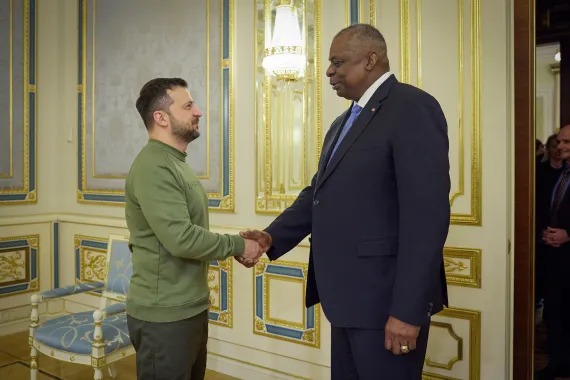US Defence Secretary Lloyd Austin touched down in Kyiv, marking his first visit to the Ukrainian capital since April 2022. The purpose of his visit was unveiled on Monday when he announced a substantial military aid package worth $100 million for Ukraine. The strategic move comes as Ukraine grapples with the ongoing conflict with Russian forces, and the United States affirms its unwavering commitment to stand by its ally.
A Pledge of Long-Term Support
During his meeting with Ukrainian President Volodymyr Zelenskyy, Defence Secretary Austin conveyed a powerful message of solidarity, stating, “The United States of America is with you. We will remain with you for the long haul.” This assurance of long-term support emphasizes the significance the US places on Ukraine’s efforts to counter Russian forces. Austin stressed that Ukraine’s struggle is not just a regional concern but a matter of global significance.
Austin highlighted the gravity of the situation, asserting that the conflict “matters to the rest of the world.” Such words reinforce the notion that the international community cannot afford to turn a blind eye to the ongoing struggles in Ukraine.
Comprehensive Military Aid Package Unveiled
As a tangible manifestation of this commitment, the newly announced military aid package includes a diverse array of resources. Among them are anti-tank weapons, air-defense interceptors, and an additional High Mobility Artillery Rocket System (HIMARS). This multifaceted support aims to bolster Ukraine’s defense capabilities and enhance its resilience against potential aggressors.
It becomes evident that the aid is not merely symbolic but strategic in nature. The provision of advanced weaponry underscores the United States’ dedication to ensuring Ukraine’s ability to defend itself effectively.
Concerns Amidst Congressional Divisions
While the military aid announcement is a significant step forward, concerns linger over the sustained commitment of allied support. The conflict’s duration, coupled with challenges on various fronts, has raised questions about the effectiveness of aid. The US and its allies have provided over $44 billion, yet doubts persist amidst the devastating Israel-Gaza war and perceived stagnation in the Ukrainian counteroffensive.
It becomes apparent that the backdrop of geopolitical complexities is impacting decisions in the US Congress. Divisions over prioritizing aid for Ukraine versus support for Israel are becoming more pronounced, further compounded by a vocal group of Republicans opposing additional aid, citing domestic priorities.
Defence Secretary Austin’s visit takes on heightened significance. His acknowledgment of Russia’s potential for increased aggression during the colder months underscores the urgency of sustained support. The aid isn’t just financial; it is a strategic imperative to prevent further Russian maneuvers that could alter the course of the conflict.















